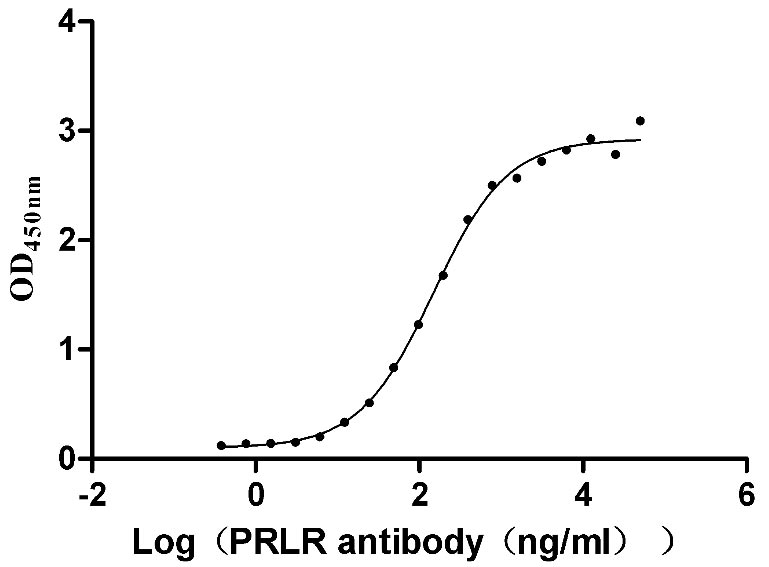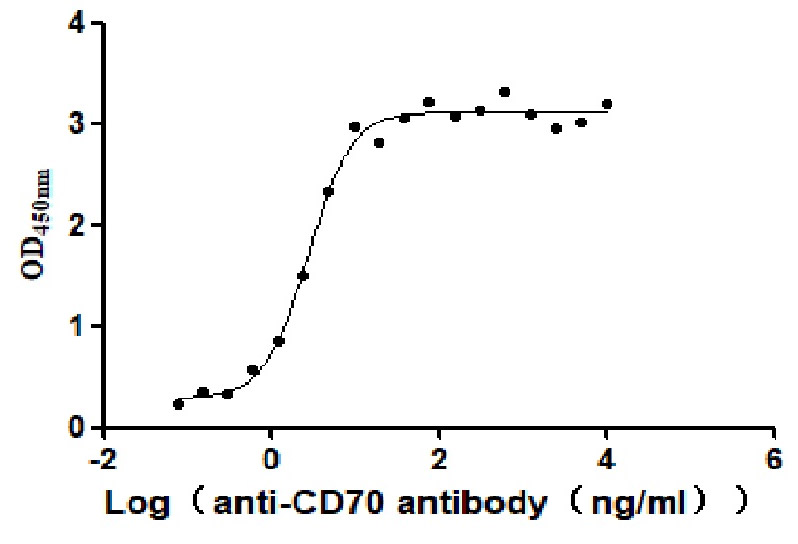Recombinant Human Zinc transporter ZIP4 (SLC39A4), partial
-
中文名稱:人SLC39A4重組蛋白
-
貨號(hào):CSB-YP747413HU1
-
規(guī)格:
-
來源:Yeast
-
其他:
-
中文名稱:人SLC39A4重組蛋白
-
貨號(hào):CSB-EP747413HU1
-
規(guī)格:
-
來源:E.coli
-
其他:
-
中文名稱:人SLC39A4重組蛋白
-
貨號(hào):CSB-EP747413HU1-B
-
規(guī)格:
-
來源:E.coli
-
共軛:Avi-tag Biotinylated
E. coli biotin ligase (BirA) is highly specific in covalently attaching biotin to the 15 amino acid AviTag peptide. This recombinant protein was biotinylated in vivo by AviTag-BirA technology, which method is BriA catalyzes amide linkage between the biotin and the specific lysine of the AviTag.
-
其他:
-
中文名稱:人SLC39A4重組蛋白
-
貨號(hào):CSB-BP747413HU1
-
規(guī)格:
-
來源:Baculovirus
-
其他:
-
中文名稱:人SLC39A4重組蛋白
-
貨號(hào):CSB-MP747413HU1
-
規(guī)格:
-
來源:Mammalian cell
-
其他:
產(chǎn)品詳情
-
純度:>85% (SDS-PAGE)
-
基因名:SLC39A4
-
Uniprot No.:
-
別名:SLC39A4; ZIP4; Zinc transporter ZIP4; Solute carrier family 39 member 4; Zrt- and Irt-like protein 4; ZIP-4
-
種屬:Homo sapiens (Human)
-
蛋白長(zhǎng)度:Partial
-
蛋白標(biāo)簽:Tag?type?will?be?determined?during?the?manufacturing?process.
The tag type will be determined during production process. If you have specified tag type, please tell us and we will develop the specified tag preferentially. -
產(chǎn)品提供形式:Lyophilized powder
Note: We will preferentially ship the format that we have in stock, however, if you have any special requirement for the format, please remark your requirement when placing the order, we will prepare according to your demand. -
復(fù)溶:We recommend that this vial be briefly centrifuged prior to opening to bring the contents to the bottom. Please reconstitute protein in deionized sterile water to a concentration of 0.1-1.0 mg/mL.We recommend to add 5-50% of glycerol (final concentration) and aliquot for long-term storage at -20℃/-80℃. Our default final concentration of glycerol is 50%. Customers could use it as reference.
-
儲(chǔ)存條件:Store at -20°C/-80°C upon receipt, aliquoting is necessary for mutiple use. Avoid repeated freeze-thaw cycles.
-
保質(zhì)期:The shelf life is related to many factors, storage state, buffer ingredients, storage temperature and the stability of the protein itself.
Generally, the shelf life of liquid form is 6 months at -20°C/-80°C. The shelf life of lyophilized form is 12 months at -20°C/-80°C. -
貨期:Delivery time may differ from different purchasing way or location, please kindly consult your local distributors for specific delivery time.Note: All of our proteins are default shipped with normal blue ice packs, if you request to ship with dry ice, please communicate with us in advance and extra fees will be charged.
-
注意事項(xiàng):Repeated freezing and thawing is not recommended. Store working aliquots at 4°C for up to one week.
-
Datasheet :Please contact us to get it.
相關(guān)產(chǎn)品
靶點(diǎn)詳情
-
功能:Plays an important role in cellular zinc homeostasis as a zinc transporter. Regulated in response to zinc availability.
-
基因功能參考文獻(xiàn):
- Results showed decreased expression of Zn uptake transporters ZIP2 and ZIP4 on mRNA and protein level correlating with SHANK3 expression levels, and found reduced levels of ZIP4 protein co-localizing with SHANK3 at the plasma membrane. ZIP4 exists in a complex with SHANK3. Further results confirmed a link between enterocytic SHANK3, ZIP2 and ZIP4. PMID: 28345660
- Expression of zinc transporters ZIP4, ZIP14 and ZnT9 in hepatic carcinogenesis-An immunohistochemical study PMID: 29895370
- exosomal ZIP4 promotes cancer growth and is a novel diagnostic biomarker for pancreatic cancer. PMID: 30007115
- Structural insights of ZIP4 extracellular domain critical for optimal zinc transport have been uncovered. PMID: 27321477
- ZIP4 regulates human epidermal homeostasis in patients with acrodermatitis enteropathica. PMID: 27940220
- ZIP4 and intracellular zinc have essential roles in tumoral growth in oral squamous cell carcinoma PMID: 28017725
- Case Report: heterozygote mutation in SLC39A4 resulting in acrodermatitis enteropathica. PMID: 26351177
- Data sho that silencing of zinc transporter ZIP4 resulted in increased bone tissue mineral density, and restoration of bone strength. PMID: 26305676
- Studied the zinc binding properties of the large intracellular loop of hZIP4. PMID: 25882556
- The results described a previously uncharacterized role of ZIP4 in apoptosis resistance and elucidated a novel pathway through which ZIP4 regulates pancreatic cancer growth. PMID: 24553114
- In glioma tumors, high ZIP4 expression was significantly associated with higher grade. PMID: 25921144
- Developed is a structural model of ZIP4 by combining protein prediction methods with in situ experiments. Insight into the permeation pathway of ZIP4 is provided. PMID: 25971965
- SLC39A4 mutations have roles in zinc deficiency PMID: 25391167
- Both acrodermatitis mutations cause absence of the ZIP4 transporter cell surface expression and nearly absent zinc uptake. PMID: 24586184
- ZIP4 activates the zinc-dependent transcription factor CREB and requires this transcription factor to increase miR-373 expression through the regulation of its promoter. PMID: 23857777
- High ZIP4 expression is associated with glioma. PMID: 23595627
- resulkts indicate ZIP4 is the only zinc transporter that is significantly up-regulated in pancreatic cancer and might be the major zinc transporter that plays an important role in pancreatic cancer growth PMID: 23331012
- The results suggest that ZIP4 may be a tumor suppressor gene and down-regulation of ZIP4 may be a critical early event in the development of prostate carcinoma PMID: 21803616
- Expression of two Zn(2+) influx transporters, ZIP2 and ZIP4, is reduced as a function of retinal pigment epithelium age. PMID: 21603979
- Zinc, copper(II), and nickel can be transported by human ZIP4 when the cation concentration is in the micromolar range; nickel can bind to but is not transported by human ZIP4. PMID: 22242765
- The transporter ZIP4 is expressed along the entire gastrointestinal tract and acts as a major processor of dietary zinc PMID: 21462106
- GSPE and EGCG enhance the expression of cellular zinc importers ZIP4 (SLC39A4). PMID: 20471814
- Cell migration assays revealed that RNAi knockdown of Zip4 in Hepa cells depressed in vitro migration whereas forced over-expression in Hepa cells and MCF-7 cells enhanced in vitro migration PMID: 20957146
- Zinc can regulate the mRNA expression of ZIP4 in Caco2 cells. PMID: 16986515
- Overexpression of ZIP4 caused significantly increased expression of NRP-1, VEGF, MMP-2 and MMP-9 and is associated with angiogenesis, invasion and metastasis pathways in pancreatic cancer. PMID: 20023433
- ZIP4 overexpression causes increased IL-6 transcription through CREB, which in turn activates STAT3 and leads to increased cyclin D1 expression PMID: 20160059
- A novel member of a zinc transporter family, hZIP4, is defective in acrodermatitis enteropathica. PMID: 12032886
- SLC39A4 is centrally involved in the pathogenesis of acrodermatitis enteropathica. PMID: 12068297
- Three novel mutations, 1017ins53, which creates premature termination codon, and two mis-sense mutations, R95C and Q303H. PMID: 12787121
- temporal and spatial patterns of expression of the mouse ZIP1, 3, 4, and 5 genes in the developing intestine and the effects of maternal dietary zinc deficiency on these patterns of expression were examined PMID: 16682017
- ubiquitin-mediated degradation of the ZIP4 protein is critical for regulating zinc homeostasis in response to the upper tier of physiological zinc concentrations. PMID: 17202136
- therapeutic strategy whereby ZIP4 is targeted to control pancreatic cancer growth PMID: 18003899
- Acrodermatitis enteropathica is a rare autosomal recessive disorder caused by mutations in SLC39A4, which encodes the tissue-specific zinc transporter ZIP4. PMID: 18328205
- the clinical manifestations in three acrodermatitis enteropathica patients with a novel mutation PMID: 19416242
- results suggest that exon 9 in the SLC39A4 gene encompassing c.1438G should be screened first in the molecular diagnosis of Japanese patients with Acrodermatitis Enteropathic. PMID: 19416256
- Knocking down ZIP4 by short hairpin RNA might be a novel treatment strategy for pancreatic cancers with ZIP4 overexpression. PMID: 19755388
顯示更多
收起更多
-
相關(guān)疾病:Acrodermatitis enteropathica, zinc-deficiency type (AEZ)
-
亞細(xì)胞定位:Cell membrane; Multi-pass membrane protein. Recycling endosome membrane; Multi-pass membrane protein. Note=Colocalized with TFRC in the recycling endosomes. Cycles between endosomal compartments and the plasma membrane in response to zinc availability.
-
蛋白家族:ZIP transporter (TC 2.A.5) family
-
組織特異性:Highly expressed in kidney, small intestine, stomach, colon, jejunum and duodenum.
-
數(shù)據(jù)庫鏈接:
Most popular with customers
-
Recombinant Human Receptor tyrosine-protein kinase erbB-3 (ERBB3), partial (Active)
Express system: Mammalian cell
Species: Homo sapiens (Human)
-
Recombinant Human IGF-like family receptor 1 (IGFLR1), partial (Active)
Express system: Mammalian cell
Species: Homo sapiens (Human)
-
Recombinant Human Prolactin receptor (PRLR), partial (Active)
Express system: Mammalian cell
Species: Homo sapiens (Human)
-
Recombinant Macaca fascicularis Membrane spanning 4-domains A1 (MS4A1)-VLPs (Active)
Express system: Mammalian cell
Species: Macaca fascicularis (Crab-eating macaque) (Cynomolgus monkey)
-
Recombinant Mouse Cell adhesion molecule 1 (Cadm1), partial (Active)
Express system: Mammalian cell
Species: Mus musculus (Mouse)
-
Recombinant Human Myosin regulatory light polypeptide 9 (MYL9) (Active)
Express system: Yeast
Species: Homo sapiens (Human)
-
Recombinant Mouse Cytotoxic and regulatory T-cell molecule (Crtam), partial (Active)
Express system: Mammalian cell
Species: Mus musculus (Mouse)
-
Recombinant Human CD70 antigen (CD70), partial (Active)
Express system: Mammalian cell
Species: Homo sapiens (Human)


















